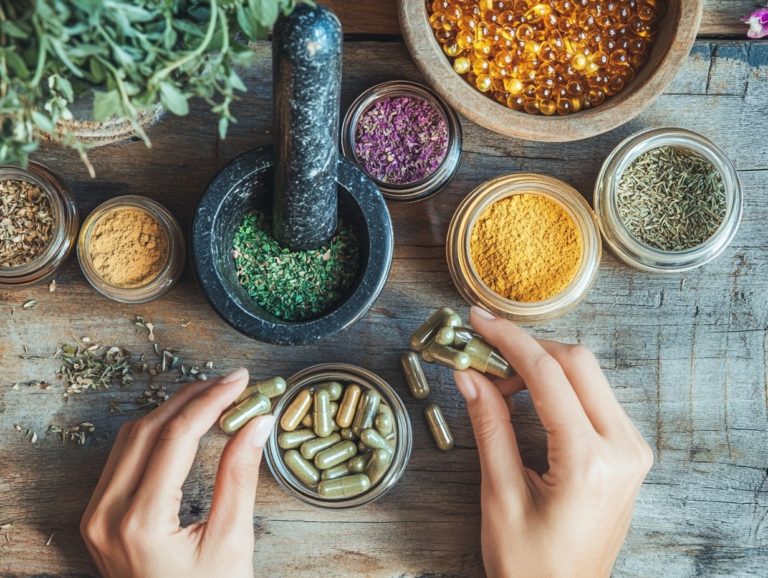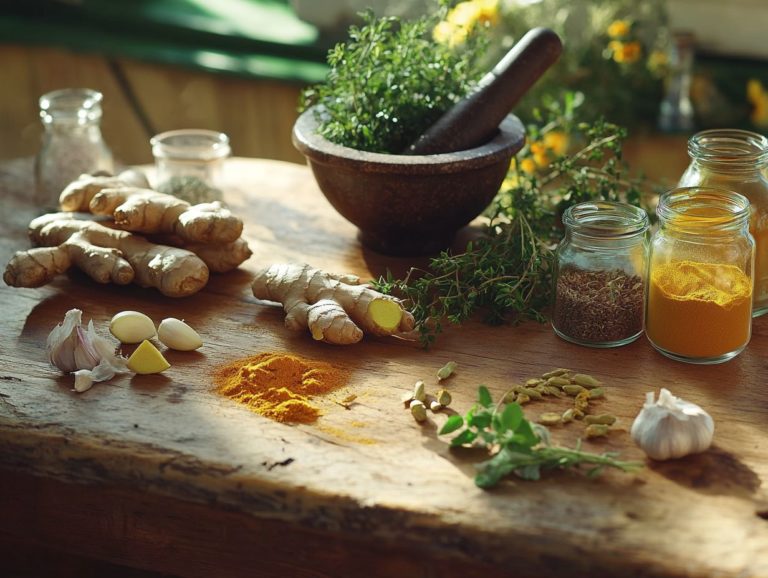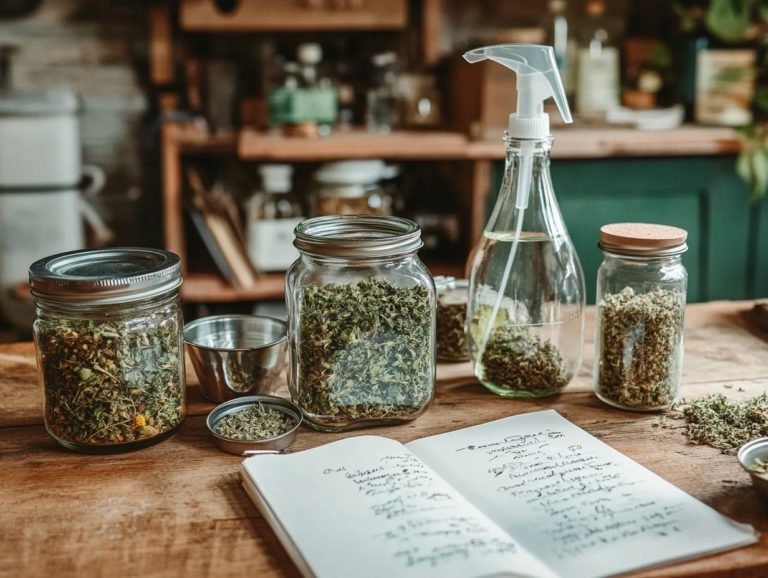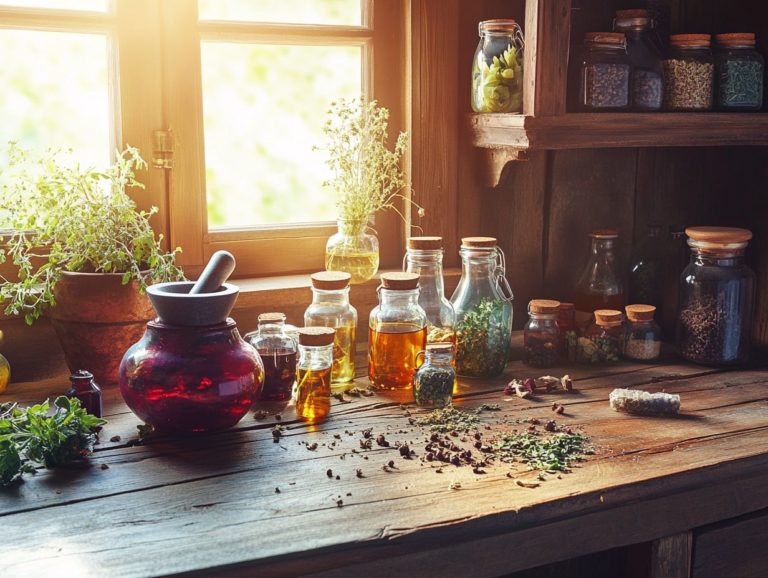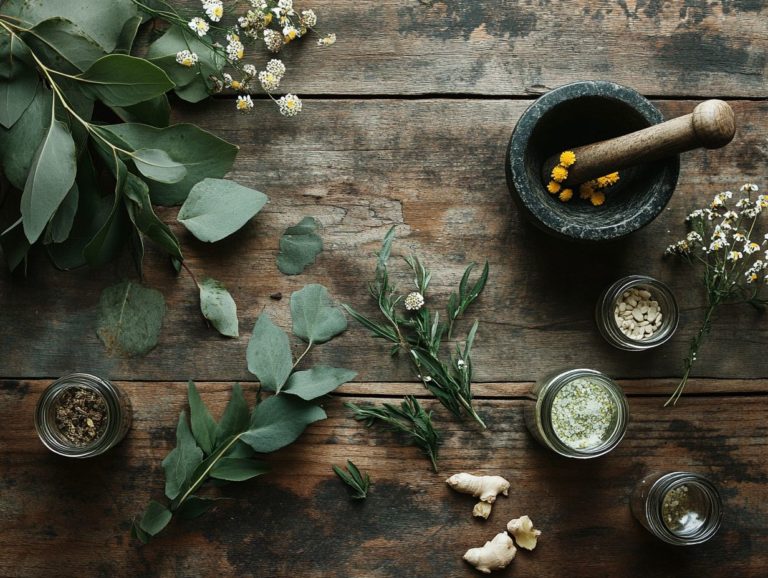DIY Herbal Treatments for Skin Irritations
Skin irritations can be annoying and uncomfortable. Understanding their types and causes is your first step toward relief.
This exploration delves into the benefits of herbal treatments, highlighting natural remedies that can soothe your skin and promote healing. You ll also discover simple DIY recipes to create your own herbal treatments right at home.
Important precautions are covered to ensure safety, along with helpful tips for preventing skin irritations and maintaining skin moisture. Get ready to discover amazing natural solutions that will transform your skin!
Contents
- Key Takeaways:
- Common Skin Irritations
- Benefits of Herbal Treatments
- DIY Herbal Treatments for Skin Irritations
- Precautions and Safety Measures
- Preventive Measures for Skin Irritations
- Frequently Asked Questions
- What are some common skin irritations that can be treated with DIY herbal treatments?
- What are the benefits of using DIY herbal treatments for skin irritations?
- Which herbs are commonly used in DIY herbal treatments for skin irritations?
- Can DIY herbal treatments for skin irritations be harmful?
- Are there any potential side effects of using DIY herbal treatments for skin irritations?
- Can DIY herbal treatments completely cure skin irritations and promote skin health?
Key Takeaways:
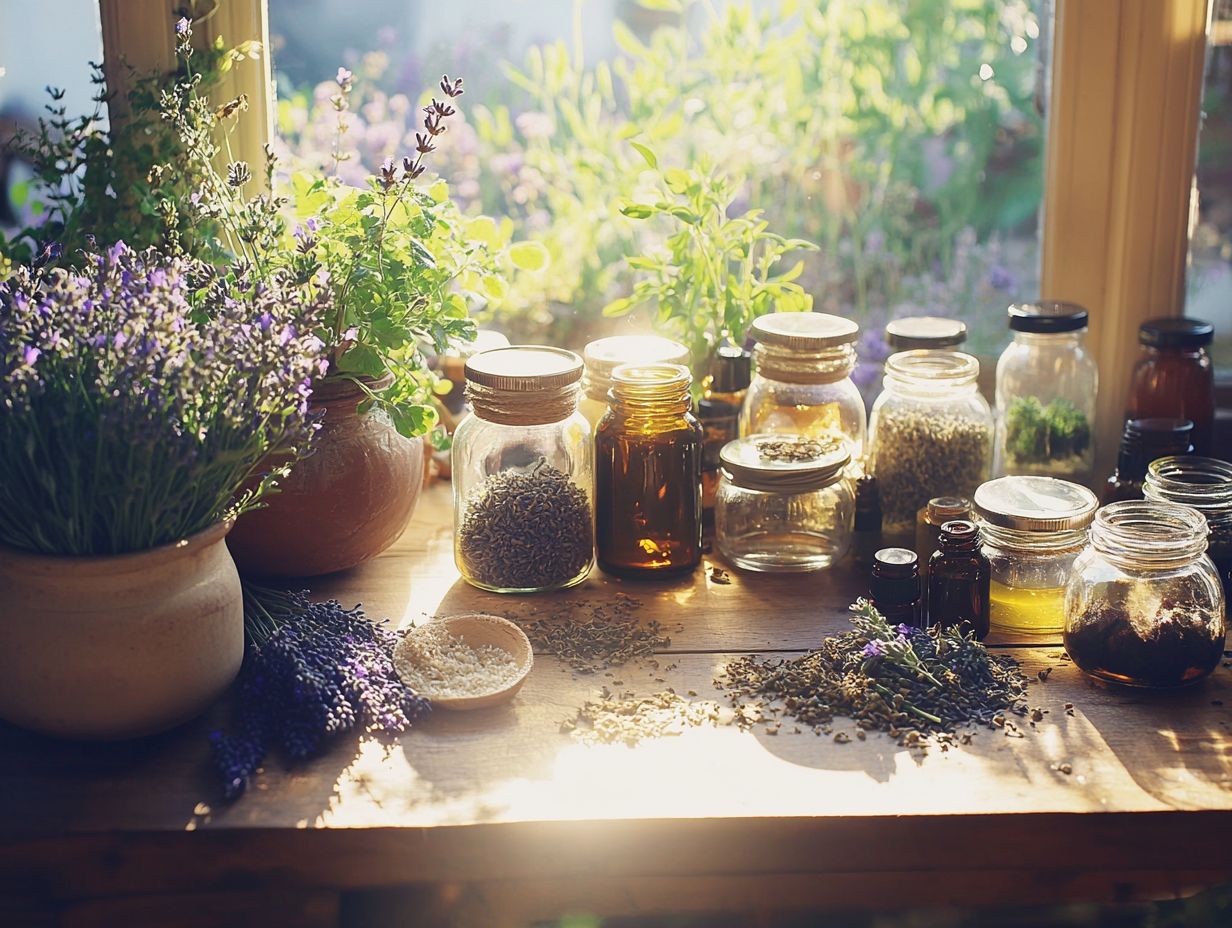
- DIY herbal treatments can effectively alleviate various skin irritations caused by allergies, infections, and environmental factors.
- The benefits of using natural remedies include their ability to reduce swelling and redness, and their soothing properties for the skin.
- It is important to know when to seek professional help and practice healthy habits to prevent skin irritations from occurring in the first place.
Common Skin Irritations
Common skin irritations are a frequent concern for many, often presenting as redness, itching, or inflammation. These issues can stem from various factors, including environmental triggers, allergens, and underlying skin conditions.
It’s essential to understand these irritations to enhance your skin health. A consultation with a dermatology expert can offer personalized insights, particularly for conditions like eczema (a skin condition that causes itchy and inflamed skin) and psoriasis (a condition that speeds up the life cycle of skin cells).
By recognizing these common skin irritations, you can adopt a proactive approach to your skincare and treatment plans.
Types and Causes
You may encounter various types of skin irritations, with eczema being one of the most prevalent skin conditions. Allergic reactions and environmental triggers can influence different skin types, leading to discomfort.
These irritations can present themselves in different ways, from persistent itching and redness to more severe rashes that might necessitate medical attention. Common culprits include allergens like pollen and pet dander, as well as irritants such as harsh soaps and chemical exposures, which can worsen existing conditions or ignite new ones. Exploring natural remedies for skin infections may provide relief and promote healing.
Genetics play a crucial role in this equation; if you have a family history of skin issues, you may find yourself more susceptible to irritations. Dermatologists often stress the importance of identifying triggers early on, as this can help you manage symptoms more effectively and prevent flare-ups down the line. Exploring unique herbal remedies for skin care can also provide additional options for soothing your skin.
Benefits of Herbal Treatments
Herbal treatments have earned their place in the spotlight for their remarkable benefits in promoting skin healing and addressing common issues. With their soothing effects, these natural remedies are more than just alternatives; they are effective allies in your skincare arsenal.
Ingredients like aloe vera and green tea serve as powerful contributors to your skincare routine. These holistic solutions not only tackle skin irritation but also elevate your overall skin health. For those interested in natural remedies, exploring DIY herbal remedies for digestive health can also be an essential addition to your daily regimen.
Natural Remedies and Their Properties
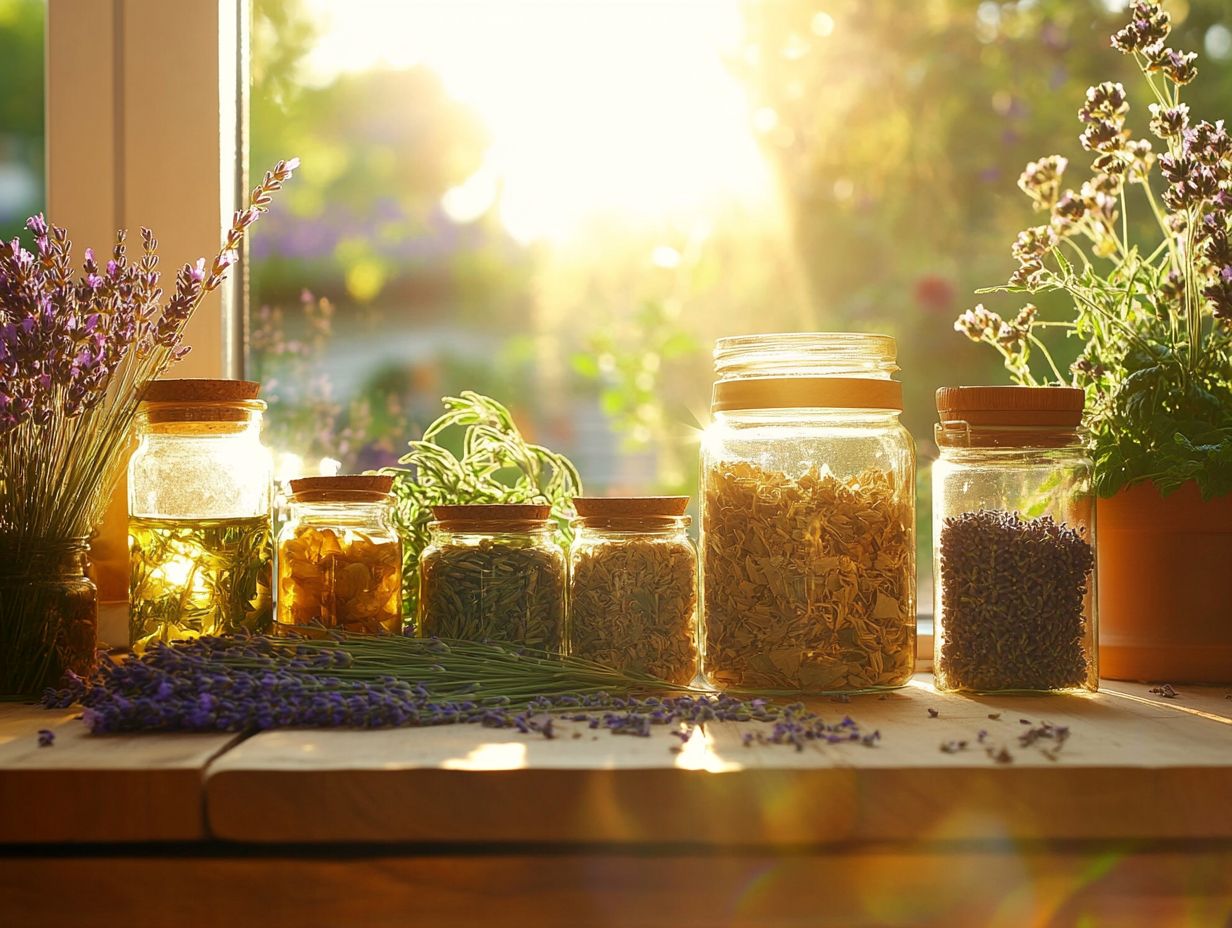
Natural remedies like honey and aloe vera are celebrated for their remarkable skin-healing properties, particularly their ability to soothe irritation and foster skin repair.
These ingredients don’t just calm your skin; they also nourish it, making them perfect for anyone aiming to elevate their skincare routine naturally. Honey serves as a natural humectant, drawing in moisture and keeping your skin beautifully hydrated. On the other hand, aloe vera is brimming with vitamins, minerals, and antioxidants that work wonders for healing sunburns and reducing redness. For those interested in exploring more, check out herbal remedies for skin conditions that can enhance your skincare approach.
Incorporating these topical remedies into your daily routine is a breeze—simply apply raw honey as a rejuvenating face mask or use aloe vera gel to soothe your skin after sun exposure. For those suffering from seasonal allergies, you might find relief with 5 DIY herbal remedies for seasonal allergies. Together, these natural wonders can help you transform problematic skin into a brighter, more youthful complexion.
DIY Herbal Treatments for Skin Irritations
Discover the joy of creating your own herbal treatments for skin irritations! This approach gives you the power to take charge of your skincare routine. You can create personalized solutions that provide soothing relief, tailored specifically to your unique skin needs, whether you’re dealing with dry skin or eczema.
Recipes and How to Make Them
When it comes to skincare, you might be drawn to popular DIY recipes like oatmeal baths for soothing relief and coconut oil applications for hydration. These natural extracts have a remarkable ability to tackle various skin issues.
Not only do these homemade treatments promote skin health, but they also provide a delightful escape into the world of self-care. For instance, oatmeal’s anti-inflammatory properties make it especially effective for anyone dealing with eczema or skin irritations. When you finely grind oatmeal and add it to a warm bath, it transforms into a silky elixir that nourishes your skin while easing itchiness. You can also explore 5 herbal remedies for skin conditions that may further enhance your skincare routine.
On the other hand, coconut oil is an incredibly potent moisturizer, packed with fatty acids that combat dryness and enhance your skin’s barrier function. By combining these ingredients, you can enjoy an affordable and accessible path to achieving radiant skin, while also exploring 10 DIY herbal remedies for common ailments to indulge in the therapeutic benefits of nature’s bounty.
Precautions and Safety Measures
Be careful when trying new skincare products. It’s important to be safe, especially if you’re prone to skin irritations. Consulting with skin doctors for professional insights and following established dermatology guidelines will help you minimize any adverse reactions to unfamiliar ingredients or treatments.
Prioritizing your skin’s health ensures a more informed and safer approach to your skincare journey.
When to Seek Professional Help
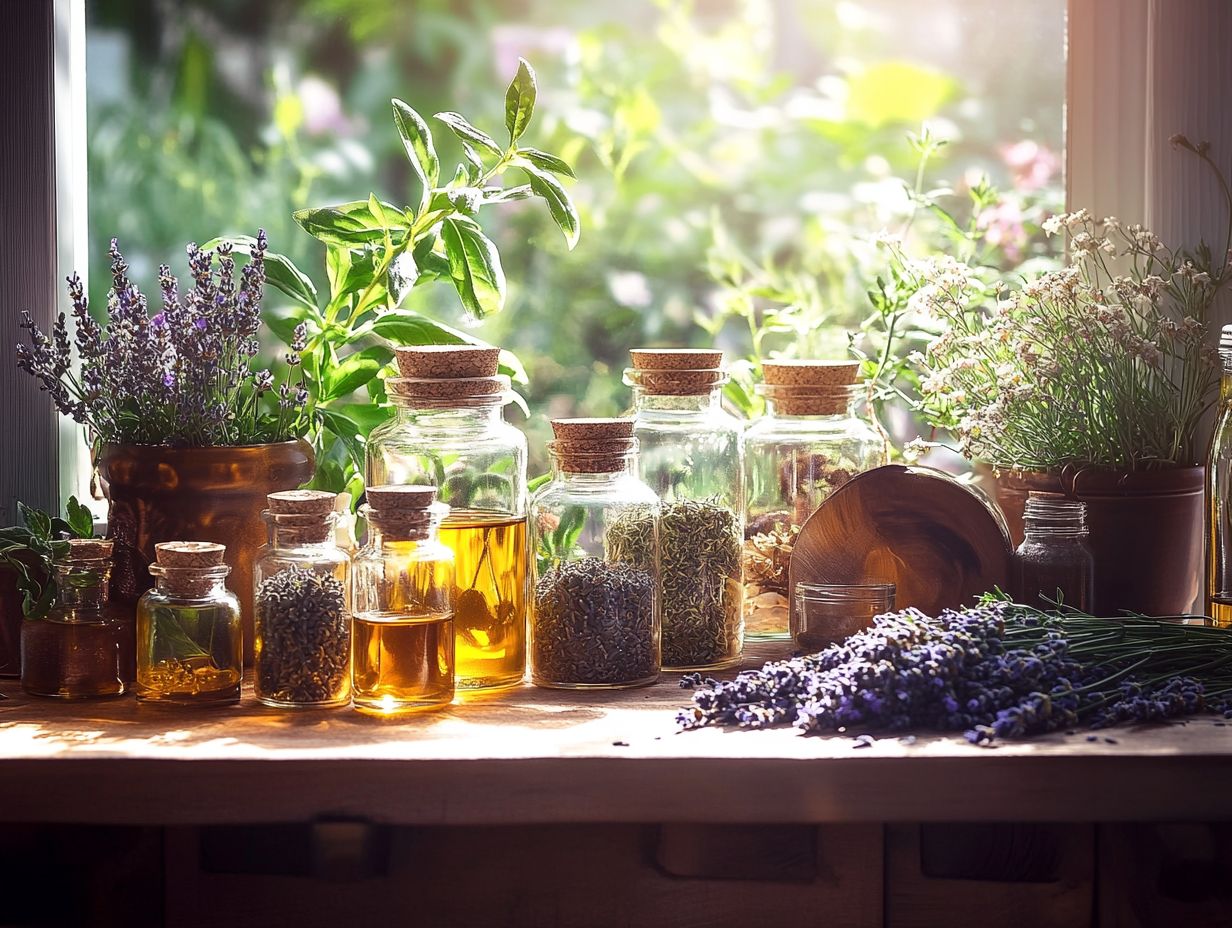
Knowing when to seek professional help is crucial for managing persistent skin issues. Skin doctors provide tailored advice and effective treatment plans for various skin irritations.
Act quickly if you notice prolonged irritation, excessive dryness, or sudden changes in texture or color. If your skin shows these signs, it may be wise to schedule an appointment. Additionally, exploring top herbal remedies for skin allergies can provide helpful solutions. Don’t overlook worsening conditions, such as increasing redness, itching, or the emergence of new growths.
Professional skin care is vital for addressing conditions like eczema, psoriasis, and acne. Skin doctors have access to advanced treatment options, from topical therapies to innovative procedures, all designed to restore your skin’s balance and vitality. Additionally, incorporating DIY herbal remedies for first aid kits can complement your treatment plan.
Preventive Measures for Skin Irritations
Implementing preventive measures for skin irritations is essential for maintaining your skin health and avoiding flare-ups. With just a few thoughtful adjustments to your skincare routine, you can unlock significant health benefits for your skin.
Healthy Habits and Practices
Adopting healthy habits like consistent skincare routines and smart hydration strategies is vital for maintaining your skin health and effectively preventing irritations.
Incorporating moisturizing creams enriched with natural ingredients can greatly enhance your skin’s barrier function, ensuring it remains supple and resilient. Focusing on a plant-based diet not only nourishes your body but also provides powerful antioxidants that fight cellular damage, promoting a radiant complexion.
Implementing sun protection measures such as applying sunscreen with at least SPF 30 every day safeguards against harmful UV rays, further protecting your skin from premature aging and potential health risks.
Together, these practices lay a strong foundation for enduring skin vitality.
Frequently Asked Questions
What are some common skin irritations that can be treated with DIY herbal treatments?

Some common skin irritations that can be treated with DIY herbal treatments include acne, eczema, psoriasis, insect bites, and rashes.
Don t miss out on the chance to pamper your skin naturally! Start your DIY journey today and enjoy the benefits of natural skincare!
What are the benefits of using DIY herbal treatments for skin irritations?
DIY herbal treatments are natural and gentle on the skin. They often avoid harsh chemicals and boost moisture levels.
Which herbs are commonly used in DIY herbal treatments for skin irritations?
Common herbs include aloe vera, chamomile, calendula, lavender, and tea tree oil.
Can DIY herbal treatments for skin irritations be harmful?
Most DIY herbal treatments are safe. However, make sure to research and consult with a healthcare professional before trying a new remedy.
Are there any potential side effects of using DIY herbal treatments for skin irritations?
Some individuals may experience skin irritation or allergic reactions. Always test a small area first.
Can DIY herbal treatments completely cure skin irritations and promote skin health?
These treatments can reduce symptoms but may not cure the underlying issue. Don t ignore persistent problems! Consult a doctor for severe skin irritations.


